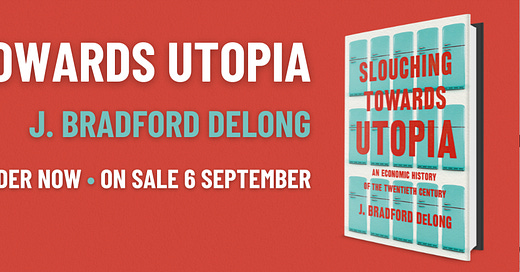¶ 4, 5, & 6: Introduction: My Grand Narrative: Slouching Towards Utopia: Notes & Long Notes
I am starting to go through the manuscript of my forthcoming book, paragraph-by-paragraph, adding in the full notes that could not make it into the print version...
¶ 4, 5, & 6: Histories of centuries, long or short, are by definition grand narrative histories, built to tell the author’s desired story. Setting these years, 1914–1991, apart as a century makes it easy for Hobsbawm to tell the story he wants to tell. But it does so at the price of missing much of what I strongly believe is the bigger, more important story. It is the one that runs from about 1870 to 2010, from humanity’s success in unlocking the gate that had kept it in dire poverty up to its failure to maintain the pace of the rapid upward trajectory in human wealth that the earlier success had set in motion.[4][k]
What follows is my grand narrative, my version of what is the most important story to tell of the history of the twentieth century.[l] It is a primarily economic story. It naturally starts in 1870. I believe it naturally stops in 2010.[m]
As the genius Dr. Jekyll-like Austro-English-Chicagoan moral philosopher Friedrich August von Hayek observed, the market economy crowdsources—incentivizes and coordinates at the grassroots—solutions to the problems it sets.[5] Back before 1870 humanity did not have the technologies or the organizations to allow a market economy to pose the problem of how to make the economy rich enough. So even though humanity had had market economies, or at least market sectors within its economies, for thousands of years before 1870, all that markets could do was to find customers for producers of luxuries and conveniences, and make the lives of the rich luxurious and of the middle class convenient and comfortable.
Printed Endnotes:
[4] Also seeing a “long” twentieth century as most useful is the keen-sighted and learned Ivan Berend, in An Economic History of Twentieth-Century Europe: Economic Regimes from Laissez-Faire to Globalization, Cambridge: Cambridge University Press, 2006.
[5] Friedrich A. von Hayek, “The Use of Knowledge in Society,” American Economic Review 35, no. 4 (September 1945): 519–530.
Longer Notes:
[k] Ivan Berend makes his choices for essentially the same reasons that I do. He, however, confines his book to Europe, and both gains and loses thereby.
Giovanni Arrighi (1994): The Long Twentieth Century (New York: Verso) <https://archive.org/details/longtwentiethcen00arri>, on yet another hand, pushes the origins of the long twentieth century back to 1500 and medieval Genoa. There are 324 pages before his “Epilogue” begins, yet it is only on page 239 that we get to:
The strategies and structures of capital accumulation that have shaped our times first came into existence in the last quarter of the nineteenth century. They originated in a new internalization of costs within the economizing logic of capitalist enterprise. Just as the Dutch regime had taken world-scale processes of capital accumulation one step further than the Genoese by internalizing protection costs, and the British regime had taken them a step further than the Dutch by internalizing production costs, so the US regime has done the same in relation to the British by internalizing transaction costs…
Thus I cannot buy into his analysis because he sees the history of the long twentieth century as largely an intensified repeat of earlier cycles of internal capitalist development led by a hegemon—Genoese, Dutch, British, and now American. That is the grand narrative he tells, engagingly and convincingly. But it is definitely not mine, and I definitely do not think it is the most important thread.
[l] There are many other stories that others tell. Let me here simply make note of seven other books:
Thomas Piketty, Capital in the 21st Century—both broader, looking back to 1600, and narrower, looking only at the political economy of inequality…
Edward Ross Dickinson, The World in the Long Twentieth Century: An Interpretive History—a much more “ecological” and less societal take…
Robert Gordon, The Rise and Fall of American Growth: The U.S. Standard of Living since the Civil War—US only…
John Lukacs, A Short History of the 20th Century—not nearly enough on the economics…
Robert Allen, Global Economic History: A Very Short Introduction—goes much further back, and gives the political-economy essentials of economic history relatively short shrift…
Karl Polanyi, The Great Transformation—of course; written only halfway through the long 20th century, but got a good deal of the essentials right…
Paul Johnson, Modern Times: From the Twenties to the Nineties—covers only the short 20th century, and imposes a neoconservative frame that is grossly inadequate to the task…
[m] Please let me delay the discussion of 2010 as the end date to much later on.






